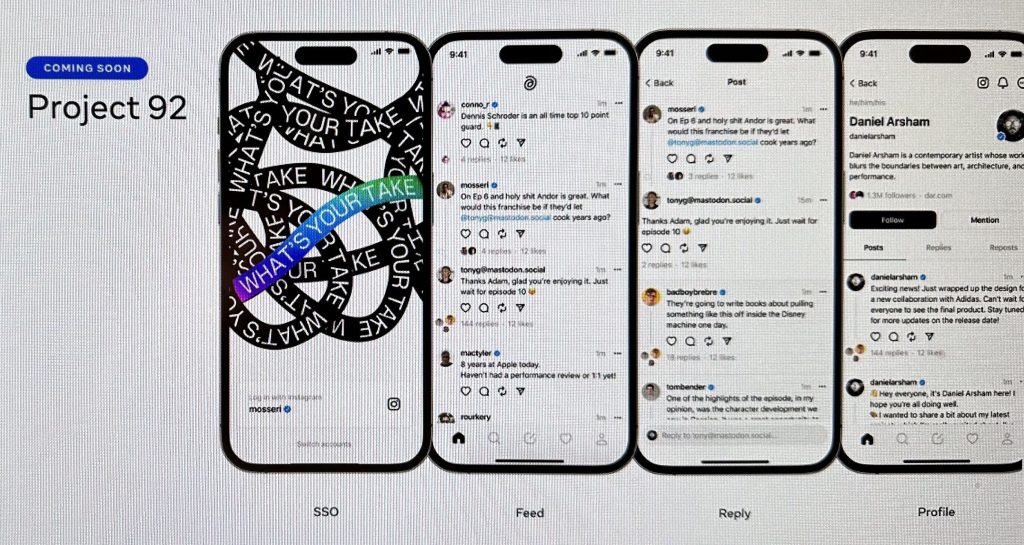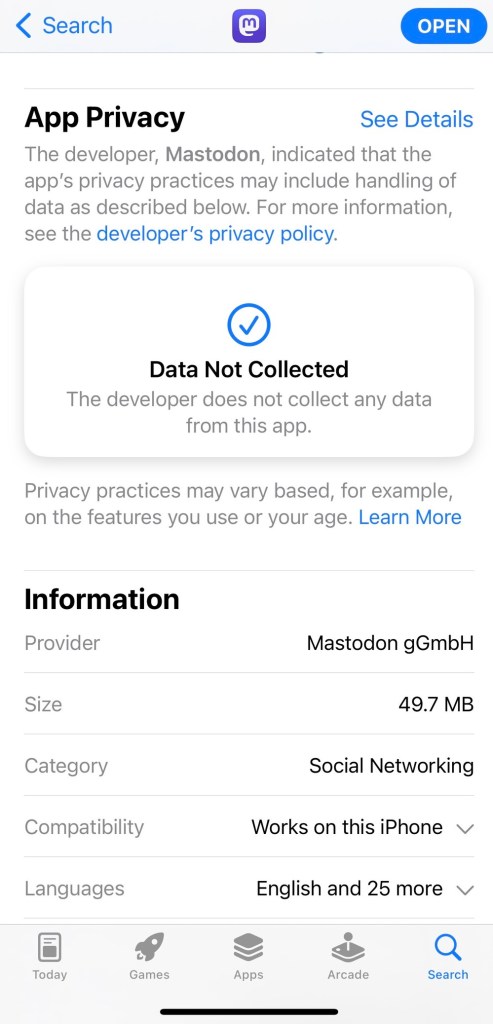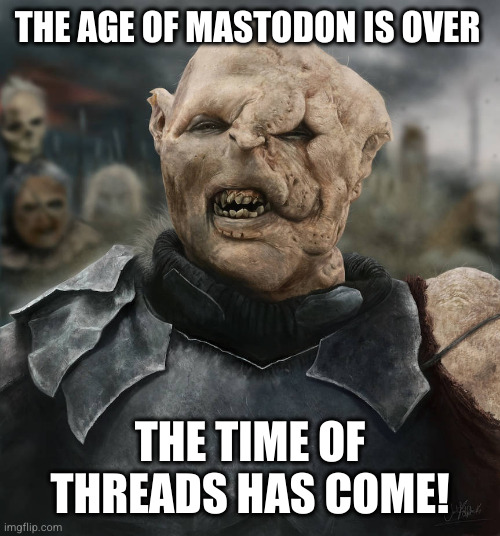Getting Tangled Up in Threads
Content warning: As Threads rolls out federation capabilities and tests out Fediverse compatibility, people are getting worked up over what's next.
If you had told me as recently as two years ago that Meta was going to create a microblogging platform, I would have scoffed. If you had told me that same network would federate over ActivityPub, I would’ve laughed in your face.
But here we are. It’s happening. We’re no longer at a point where people can laugh and shrug it off. Meta is coming, and people are collectively losing their minds over it.
The question is, are they overreacting? Is there something to it? I’ve had to do a lot of reflection on the subject, and I’d like to break things down my thoughts. I think a lot of people are worried about how the Fediverse might ultimately change, but I think the transformation could alter the entire Internet for the better.
What are people worried about?
Generally speaking, most of the feedback I’ve been seeing boils down to about four different responses:
1. Meta is going to Embrace, Extend, and Extinguish the Fediverse
This is the most common response I’ve seen, and a lot of people that support this view point to XMPP’s dwindling support between Facebook and Google.
The theory goes like this: a company decides to support an open standard, because it’s a popular thing that people expect support for. Then, when that company’s offering hits a critical mass of users, they quietly kill off support for that standard and keep the people on their platforms.
This kind of thing isn’t completely unheard of, and dates back to the Microsoft playbook of the 1990’s, but the XMPP situation that many people refer to is a misrepresentation of what actually happened. While XMPP was open for anyone to implement, there’s little evidence to suggest that it was ever particularly popular, or that people were demanding it.
I am not open to your ahistorical take on Google Chat and XMPP.Google didn't do anything wrong by using an open standard.
They didn't do anything wrong by building a good interface that people liked to use.
And they didn't do anything wrong by disconnecting from the network when the spam and harassment outweighed the benefit to their users.
We, the XMPP community, failed to capitalize on success by diversifying the network. It's our own fault not enough nodes were there.
— Evan Prodromou (@evan) 2023-07-09T19:10:35.220Z
The idea that XMPP had its thunder stolen by conniving businessmen is completely detached from reality. If anything, these businesses built an integration, saw that only a handful of its users actually took advantage of it, had to deal with an increasing amount of spam, and quietly killed it off with little fanfare.
After seven years, it’s evident that the rest of the industry is not moving to embrace this open system. If at some point in the future, the industry shows interest, we would then be open to discussions about developing an interface that’s designed for modern needs.
Google Spokesperson on dropping XMPP, PCWorld article
Threads could still decide that the juice isn’t worth the squeeze with ActivityPub, and reverse course at any time. Take a second to consider, however: it’s already bad enough when two instances sever user connections. People literally can’t follow their friends in the process. Even if the connection is later restored, those user connections may remain broken. It’s an action with huge consequences.
Verdict: Unlikely
The Fediverse is in a much different place now, compared to where XMPP was in the early 2000’s. Millions of people use it every day, and there’s a vibrant ecosystem of apps and platforms that empower hundreds of distinct communities all over the web.
If anything, it may be that Threads is looking to be a major player in the space, and hopes to benefit from an ecosystem shift by being the biggest project out there. Maybe that situation looks like developing a better API and clients than what Mastodon has, and getting other platforms to use it over MastoAPI.
Maybe Threads will develop some high-end infrastructure projects, to handle a vast amount of users. Who knows? It’s possible that Meta might make the GraphQL or React of Fediverse technologies at some point.
2. Threads will poison Fediverse culture
The idea goes like this: in addition to the sheer amount of brands and influencers chasing engagement, Threads allows hate speech, and is poorly moderated, to boot. Content is going to become more hostile, more aggressive, and more centered around chasing engagement.
I think instance admins wanting to protect their communities, and community members not wanting to see anything from Threads, is a totally fair position. The promise of the Fediverse is that individuals ought to be in charge of who and what they see on the network.
Stop Using Threads consumes a list of users and tells you which of those users interact with Threads. You can use it to remove Threads participants from your timeline.You can find out the tool's opinion on you by entering your own name, or you can just Submit with default settings to find out about Gargron.
https://stop-using-threads.net/
Data practices, anti-abuse and opt-in/out are behind the link. If you didn't opt into search, you're not visible here either.
— Pyrex, nightsworn alchemist (@pyrex) 2023-12-15T18:00:32.881Z
The problem is that there’s a movement of people who want to block anything and anyone that doesn’t choose to block Threads themselves. This kind of thing has been going on for a while, where a group of admins will choose to cut off connections to another server, because its federation policies allow connections that their own policies forbid.
A lot of people worry that this hysteria could lead to a massive fragmentation of the Fediverse, effectively doing Meta’s job for free. Either we’re all going to drown in the noise produced by Threads, or the networks will become increasingly isolated.
Verdict: Maybe
The Fediverse has been through a significant amount of cultural shifts over time, and people tend to forget how exactly the network has changed. Meta has dropped the ball on moderation several times over, and their decisions of what’s acceptable on their instance could end up establishing norms that didn’t exist before. It’s going to be up to users and admins over whether they want to deal with any of it.
Meta is going to harvest all of our data
It’s hard not to see this one, given Meta’s reputation with Facebook and Instagram. Even when the Threads app came out, people were quick to highlight the egregious data collection the app was doing.
Look, Meta is no doubt going to collect data from their own users, and use it for a variety of purposes. That’s covered by their EULA. But scraping public statuses to perform analytics, track people, sell data, and serve ads? Legally, that’s a sticky situation, when it comes to people who never signed a EULA with Threads or Meta.
Verdict: Maybe
Look, there’s nothing really stopping anybody from scraping public posts in the network and doing something with the resulting data. It’s not a great situation, and will likely be a sticking point when it comes to user consent.
On the other hand, though, Meta might find itself in legal hot water if it gets caught doing this. A class-action lawsuit might emerge, or a smaller network like Tumblr might give Meta grief over harvesting Tumblr data. Given the regulatory scrutiny Meta is facing from the EU, it might not be an action worth taking.
4. Threads is going to overrun us
This point is the least talked about, but the most concerning to me. It’s actually deeply worrying, because we don’t really have any good workaround yet.
Here’s the thing: Threads will bring over 100 million users to the Fediverse. Maybe not all at once, but it’s going to be the biggest instance, with the biggest footprint. We’re talking millions, maybe even billions of statuses federating out every day. It’s going to be bigger than all of Mastodon put together. The entire ecosystem and culture could shift.
One really big side effect stems from this: smaller servers could get hit hard. We’ve never been at a point where so many activities stemming from one place could pass through so much of the network. It could put many members on the network at a severe disadvantage, even if they blocked Threads entirely.
Verdict: Highly Probable
Look, the network’s been growing larger, at a faster rate, over the past 15 years of its existence. When it was initially built, nobody anticipated millions of concurrent connections passing data back and forth.
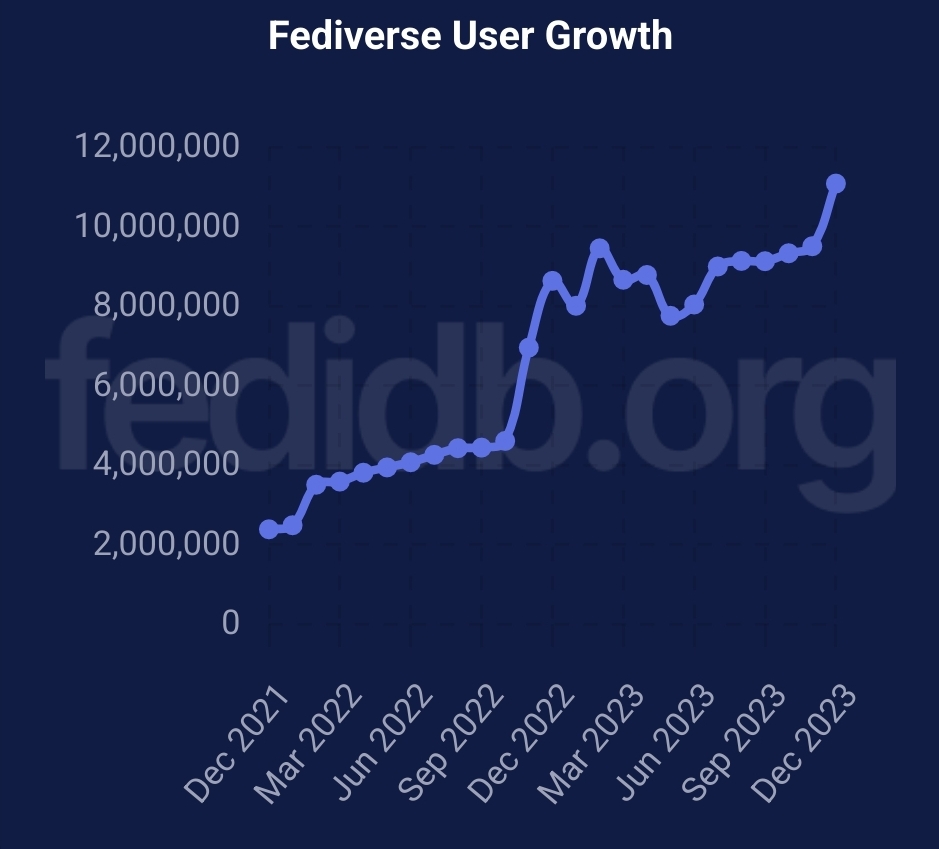
Even within the last few years, the size of the network has become unfathomable. Every time that a new migration from Reddit or Twitter or another popular app happens, the network strains and struggles to grow as tens of thousands of people pour into servers that originally only expected a few hundred inhabitants at most. The network scales, but we’re really bad at it.
What are the upsides?
There’s a lot of gloom and doom talk right now, but let’s focus on some positive changes that are happening right now: the network is vibrant, growing in variety, and becoming more mainstream and more available to the general population.
Everything, all at once
Going on the Fediverse right now, I can follow news publications, public companies, government officials, activist organizations, and collaborative projects. I can follow ESPN, the BBC, George Takei, and Indivisible. This is all in addition to the people I regularly talk to and interact with on the network.
As someone that joined Identica back in 2008, words cannot express how crazy this is to me. These aren’t just fake accounts or Twitter mirror bots. There’s journalists and celebrities and game developers and musicians and all sorts of other people actively using the network now.
Changing the Face of the Internet
But, it goes way further than just accounts on servers: Flipboard is incorporating ActivityPub into their platform directly. WordPress has a plugin, and Automattic made every WordPress.com blog capable of opting in. Medium has been testing the waters with their own Mastodon instance.
If Meta ends up becoming a part of the Fediverse, this development might just tip the scales, and inspire dozens of other platforms to participate. Suddenly, it makes more sense for Tumblr and Flickr to enter the fold, and dozens of entirely new platforms will emerge, too. Beyond just being a W3C standard, ActivityPub could crystalize into a de facto standard for social platforms.
What should we do?
Despite all of the gloom and doom talk, I’m cautiously optimistic. This situation might just be the push the Fediverse needs to step up on several of the shortcomings we inherited from Mastodon.
Build more resilient infrastructure
The massive success of Mastodon has brought the Fediverse to a whole new level, when it comes to the ecosystem and the amount of users taking part in it. Unfortunately, relying primarily on one dominant platform has introduced a lot of technical debt to how the Fediverse is currently built.
A very common trend I’ve seen with Fedi development personally is that a lot of important architectural decisions are made after their necessity becomes justified. GNU Social didn’t care about private statuses, because it was originally meant for public microblogging. Mastodon didn’t really care too much about scaling, until servers started experiencing large migrations of users. PeerTube didn’t really think about moderation tools, until users pointed out the need to mitigate online harassment.
We’re about to arrive at a point where hundreds of millions of people might be part of the network. Nobody optimized any architectural pieces, because nobody really thought it was going to happen anytime soon. But if Meta comes, other networks inevitably will, too. We need to figure out how to handle the load without pricing small server operators out of the equation.
Let users choose what they connect with
For some time, admins have been the deciding factor of which servers their users can federate with. From a protective stance, it makes sense: hard blocking can minimize interactions coming from bad servers. But, there’s sometimes disagreements on what constitutes “bad”, and who should get to make that call.
After some careful consideration, I have decided to block threads.net on pixelfed.social and .art by defaultHowever, users will have the ability to unblock the domain
Soon we will be selectively enforcing authorized fetch for accounts with domain blocks so as to provide the best of both worlds.
(I'm also shipping a command for 😛ixelfed: admins to easily add user domain blocks for all local users)
I'm eager to hear your feedback!
PR: https://github.com/pixelfed/pixelfed/pull/4834
— dansup (@dansup) 2023-12-21T09:29:47.413Z
Pixelfed is leading the way with the development of a new feature: users can opt in to connecting to a domain, even if most of the instance doesn’t receive anything. Not only is this a great way forward, but it puts choice in the hands of users while still holding a general policy.
Build a proper ActivityPub Test Suite
The current situation with ActivityPub compatibility is not great: because Mastodon is the biggest platform in the space, everybody just does whatever Mastodon does. Devs literally just test against it, and hope for the best when it comes to being compatible with other platforms.
What do you think is going to happen when the de facto standard is going to be surpassed by something with a hundred times more users? Does it even make sense for developers to care about Mastodon’s API, if the user base is only a fraction of the size?
The ideal situation is for a platform-agnostic ActivityPub testing suite that everybody can test against to fix bugs, make sure federation works, and establish standard behavior. If we can get the main platforms of the Fediverse to test against this, we could probably get Meta to do it, too.
This is something a handful of members from the W3C SocialCG are currently demoing and talking about, and an NLNet grant currently points to one such attempt.
Develop better controls for privacy and security
As I stated in my Mastodon Myths article, Mastodon’s security and privacy provisions are paper thin, lack granularity, and in some cases are easily subverted.
We can play whack-a-mole with blocklists, and pretend that there aren’t any problems, but developing user controls around consent are absolutely critical, especially if the network is about to grow nearly 100 times bigger.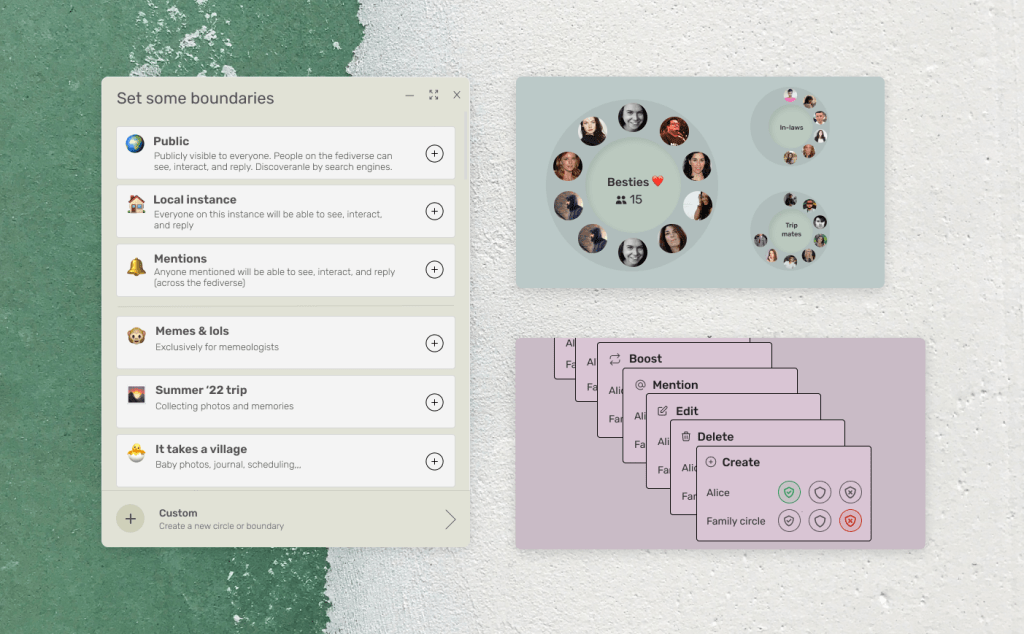
Mastodon can look to platforms like Hubzilla and Bonfire with ideas on how to implement controls like this. Who can look at a status? Who can respond, or share it around? Who can message me directly? We need to empower users, and standardize those conventions.
Conclusion
Change is scary, especially when so many details appear to shift in direction and polarity. Threads being a part of this place feels like a paradox to some, and sacrilege to others. None of us want to see the Fediverse turn into a toxic dumping ground for the worst that social media has to offer. Nobody wants the Googles of the world to hijack an Internet standard.
A part of me remains incredibly optimistic: the Fediverse might actually hit an inflection point that transforms the entire Internet for billions of people. In our battle against social siloes and surveillance capitalism, we might find that the Fediverse won.

I am not open to your ahistorical take on Google Chat and XMPP.Google didn't do anything wrong by using an open standard.
They didn't do anything wrong by building a good interface that people liked to use.
And they didn't do anything wrong by disconnecting from the network when the spam and harassment outweighed the benefit to their users.
We, the XMPP community, failed to capitalize on success by diversifying the network. It's our own fault not enough nodes were there.
BBC Mastodon
This is an experimental Mastodon instance run by BBC Research and Development.Mastodon hosted on social.bbc
